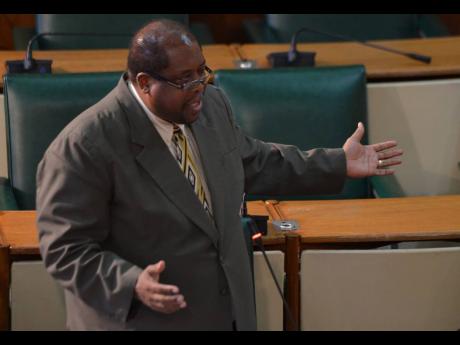Editorial | Unfriendly to the disabled
That Gordon House remains a challenging if not hostile environment for the physically disabled – as Lambert Brown recently found out – is not so much a case for a new parliament building as a statement of the priority Jamaica, including the State, places on accommodating or embracing people with disabilities.
Public officials often say the right things and set seemingly appropriate rules, which soon drift from their consciousness and are forgotten. In other words, declarations tend to be conflated with action so become, in policymakers’ minds, the ends themselves.
In this case, Parliament, in 2014, passed a Disabilities Act that set out obligations to ensure the society’s fair treatment of people with disabilities, including their capacity to access buildings.
It took nearly eight years between the approval of that law and the crafting of its operating regulations and, therefore, the timing of its promulgation in February 2022. After that, the legislation gave owners and operators of public and commercial buildings two years to make their premises “readily accessible and usable to a person with disability”.
Mr Brown, an opposition senator, recently suffered a serious illness. He returned to the legislature this month, days before the grace period ended for the retrofitting of public and commercial buildings.
BOUND BY RULES
Section 49 of the law says: “This Act binds the Crown ... .” In other words, the Government is bound by its rules and regulations and like private persons, can be held legally accountable for failing to adhere to its requirements. Citizens have the right of action and redress.
Mr Brown told his colleagues the difficulty he had, as a temporarily physically disabled person, ascending Gordon House’s single flight of stairs even with the aid of his nurse.
“... Lawmakers are the biggest promoters of law breaking when it comes to the Disabilities Act,” he said.
This, of course, should not be the case. The managers of Parliament were not taken by surprise and ought to have been keenly aware not only of their obligations, but of the symbolic value of the legislature being seen to do the right – not least with respect to this law.
Moreover, in February 2022, at the time the Disabilities Act was being promulgated, Gordon House was in a tizzy over the disrepair of a wheelchair lift, whose batteries had, apparently, run down. It may have been left unserviced for so long as to cause questions as to whether it could ever be operable again.
And as Mr Brown reminded the Senate, there have been multiple promises, over several years, to install an internal lift at Gordon House – which has not happened.
Mr Brown’s ultimate takeaway from the absence of these facilities is that a new parliament building is required.
“It’s time for the construction of a modern Parliament that can meet the requirements of the Disabilities Act,” he said. “What example is Parliament setting for the rest of the nation when the Parliament itself is in breach of its own laws that access must be available to people with disability?”
RHETORICAL QUESTION
That is a logically rhetorical question. The construction of a new parliament building may indeed be sensible, although not, as proposed, at Heroes Circle, so as to deprive surrounding communities of the last significant bit of green space in downtown Kingston. But constructing a new parliament building, which will take years to complete and cost billions of dollars, does not obviate the Government’s immediate obligation to the requirements of the Disabilities Act.
Having a fully and consistently operable wheelchair lift at Gordon House should not be beyond the capabilities of the Government. Neither does it require engineering genius to install a small elevator in the building. There are various technologies for those that are designed for use in small spaces. It can be done in days.
In the meantime, the labour and social security minister, Pearnel Charles Jr, who has oversight of disabilities policy, should commission a review of compliance with the law, starting with government buildings. Further, the Jamaica Council for Person with Disabilities should also produce, and seek to have tabled in Parliament, a review of compliance with the social provisions of the act.

